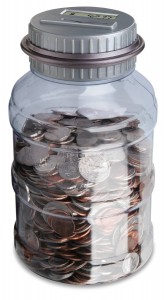Manage Your Finances Without a Budget in Two Simple Steps
Read or watch anything related to personal finance and you will be sure to find the idea of creating a budget near the top of the list. This makes sense since a budget is the foundation of your finances and without one, you will have some difficulty choosing the best way possible to manage your finances.
But what if there was a way to make managing your money easy without having to go through the process of creating a budget? Is there a way to make this possible? The answer is yes. And I am going to tell you how to manage your finances easily and without a budget.
Budgets Make a Difference
But before we get into the details, I want to be clear: there is no substitute for a budget. Having a budget is your best option, hands down. This is because it will show you how you are spending your money. There are lots of “little†expenses we incur that we never give much thought to in the moment, but when we see them added up over the course of a month, we realize just how costly that small expense really is.
While the easy way to manage your finances is my tricks below, you should work your way towards using a budget. It might not seem critical now, but it really does make a huge difference when it comes to meeting your financial goals.
Two Steps to Manage Your Finances Without a Budget
1. Pay Yourself First.
Why do most people not have any money saved? The reason is because they pay themselves second. The thinking goes that you will buy what you want and at the end of the month, and whatever is left over, you will save.
But nothing gets saved because you spend all of your money. So, you simply have to flip this around. Pay yourself first and then spend everything that is left.
Doing this is easy. If you have a 401k plan at work, just contribute 10% of your salary to it. Next, set up an automatic transfer from your checking account to your savings account on the days you get paid. With most people having access to their account online, this will take you less than 10 minutes.
In less than one hour, you can guarantee you save money each and every month. Once you do this, make it a habit of increasing the amount you save each year. So if you are saving 10% in your 401k plan or Roth 401k plan this year, increase it to 11% next year. By saving such small incremental amounts, you won’t notice the money not in your main spending account.
Read More: Why You Should Save 1% More Each Year
2. Don’t Overspend.
The second trick to manage your finances is just as easy as the first. It is to simply not spend any more money than you currently have in the bank. In other words, you cannot overspend and use your credit cards. Let me rephrase that, you can use your credit cards; you just have to pay them off in full each and every month. You cannot carry a balance from month to month thinking that you will just use your next paycheck to cover the purchase. This is not living within your means.
So, if you really want that flat-screen TV that costs $400 but you only have $200 in your bank account, you can’t buy the TV. It has to wait. Same idea applies for any other item you might want.
For most, this will be the harder of the two tricks. We have been conditioned to want things now and not wait. But this is why so many are in the financial situations they find themselves – they overspend and don’t care about the consequences until they are staring at their credit card statements and realize they are in a mountain of debt.
Because of this, you will probably fail at this trick at first. But don’t give up. Learn from the mistake and try again. As long as you take the time to learn something from the setback, you will increase your odds of succeeding in the future.
Read More: 5 Steps to Overcoming a Financial Setback
Final Thoughts
Overall, a budget is an important tool if you plan to reach your financial goals. Using the tricks I’ve outlined above – paying yourself first and avoiding debt – will go a long way in helping to manage your finances if you choose to not use a budget today.
But don’t think that this gives you a free pass for never creating and using a budget. You should still progress towards using a budget, as it will be the most helpful tool in helping you to achieve your financial goals.






Very good advise. I will be paying myself in 2 years when I get $11,000 in credit card debt paid off. Since 2007 I have added $10,000 in credit card debt. This was not as hard as you think. Just $105 per month, using 10% of monthly income to service debt. Making just a little above minimum payments. I am now using 40% of my monthly income to pay down debt, now.
Anyone that has credit card debt should pay it off before saving anything. I have cut my monthly interest costs by $50 per month in the last 6 months and it goes down each month.
I will be getting Social Security at 62, in 2 years and have 66% more monthly income, more than I have ever had in 41 years.
I will be debt free and be able to save over $1,000 per month